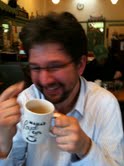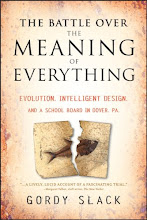 Phenobarbital is one of the oldest and most potent pharmacological treatments for epilepsy, and it is still, nearly a century after its discovery, the most widely used anti-seizure med in the world. But it has a checkered past. And now it's use in young, developing brains has been linked, in animal models, to an increased likelihood of schizophrenia later in life.
Phenobarbital is one of the oldest and most potent pharmacological treatments for epilepsy, and it is still, nearly a century after its discovery, the most widely used anti-seizure med in the world. But it has a checkered past. And now it's use in young, developing brains has been linked, in animal models, to an increased likelihood of schizophrenia later in life.Phenobarb was invented in early 20th-century Germany and used as a potent tranquilizer for more than a decade before a young German doctor, Alfred Hauptmann, discovered that it not only calmed his epileptic patients' nerves, but, in many cases, it also suppressed their seizures. In the 80-plus years since, phenobarb has prevented more seizures--probably by several orders of magnitude--than any other anti-epileptic drug. Its widespread adoption marked a huge step forward in the treatment of epilepsy. When phenobarb replaced bromide--which was both nasty and ineffective--as the treatment of choice for seizure disorders, many patients gained complete control of their seizures and many more were able to leave institutions and resume normal--even if not completely seizure-free--lives.
The barbiturate has has relieved huge amounts of suffering. But it has caused suffering, too.
In one of the sickest mis-applications in pharmacological history, overdoses of phenobarbital, then under the brand name Luminal, were used by German eugenicists, many of whom were doctors, in the state-sponsored program of killing children born with deformities or diseases (including epilepsy.)
Now, according to a paper just presented in Chicago by a team of researchers from Georgetown University Medical Center, phenobarbital has been linked to a rise in schizophrenia-like conditions in the developing brains of animals. Guillermo Palchik, a doctoral student at Georgetown's department of pediatrics, said that the study raises doubts about the long-term safety of prescribing phenobarbital to infants.
According to Palchik and colleagues, an association between early childhood seizures and an increased likelihood of schizophrenia later in life has long been recognized. But do the seizures cause brain damage that leads to schizophrenia? Or does brain damage caused by phenobarb in regions of the brain associated with schizophrenia explain the trend? The question remains unanswered, but the new Georgetown study suggests an urgent need to take a longer, harder look at the drug end.


2 comments:
There's a link between early anticonvulsant use and autism - at least some people say so - they call it Fetal Anticonvulsant Syndrome: http://www.ncbi.nlm.nih.gov/pubmed/16108456
Appreciate you blogging tthis
Post a Comment